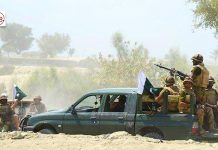Authors: Jamal Baloch & Beebarg Baloch
The Pakistani Counter Terrorism Department (CTD), acting on orders from the “deep state” Pakistan Army, has executed hundreds of innocent Baloch in a wave of extrajudicial killings that may qualify as crimes against humanity. Needless to say, these killings have often been executed without any formal or proper investigation.
According to our study, the Counter Terrorism Department has systematically and consistently staged encounters in which it has targeted mostly vulnerable and underprivileged Baloch persons. In addition, many of them were pressurized into confessing of crimes they did not commit.
Recently, news broke on all Pakistani TV channels that a “terrorist” by the name of Shoaib was detained by the CTD on July 4th, confessed to the crime.
In a news conference in Karachi alongside Administrator Murtaza Wahab and Rangers officers, Sindh Information Minister Sharjeel Memon said that the Balochistan Liberation Front (BLF) commander, responsible for the Karachi University bombing, had been arrested from Hawks Bay on July 4.
In the meantime, according to Mahrang, Azam’s daughter, on April 29, 2022, intelligence agencies abducted her brother from his home in Karachi’s Gulshan-e-Iqbal Bashir Goth. Later, CTD Karachi asserted that it had arrested her brother Shoaib from Karachi on July 4.
Shoaib’s sister Mahrang Azam has debunked all of the provincial minister’s accusations on Twitter and stated that her family is afraid for Shoaib’s safety as a result of the provincial minister’s phony news conference.
Many Balochs from Karachi were forcibly disappeared after the attack on the university, including Shoaib Azam, a local of Khuzdar Naal. Since then, their relatives have demonstrated in front of the Karachi Press Club over their forced disappearance.
It should be noted that the Counter Terrorism Department has in past also made “arrests” of people who have previously been listed as enforcedly disappeared persons, such as Husnain Baloch, who was abducted from Quetta, Latif Zehri, who was abducted from Karachi, and many more.
Prior to becoming the Counter Terrorism Department (CTD), which is a quick response task force of the police, it was known as the Crime Investigation Department (CID). It was established to deal with al Qaeda and other groups, in 2010. Later, the CTD began its involvement in the same activities that Frontier Corps (FC) and intelligence services had been engaged in for decades —enforced disappearances, home raids, and bogus arrests of people who had previously been abducted.
Shafqat Rodini and Abraham Nichari’s 2015 abduction from Quetta, presentation to the public at a press conference, and subsequent killings in a staged encounter near Kanak are still vivid memories in the Baloch communities, the then home minister, Sarfraz Bugti made the assertion of their arrest.
The CTD is involved in numerous incidents of this nature and operates with the support of Pakistan’s military and intelligence agencies. The intelligence agencies also issue all of their directives to the CTD.
In a similar way, the CTD admitted in 2019 that it had detained five suspects in Karachi in connection with the attack on the Chinese Consulate. The suspects were Hasnain Baloch, who had reportedly been abducted from Quetta, Latif Zehri from Karachi, and Arif Hussain from Balochistan. Three months after their abduction, they were falsely accused of embezzlement and imprisoned.
Media sources assert that the CTD killed over 20 captives in Balochistan throughout 2021 during five fictitious encounters. The CTD had killed five people who had previously been forcibly disappeared in Mastung, Balochistan in March 2021. Samiullah Pirkani and Jamil Pirkani, the two killed teens, have previously appeared before a police magistrate. The other three, who were already in Pakistani military dungeons, were allegedly executed in Mastung, Balochistan, and they were unjustly accused of having ties to Baloch militant organizations.
In two different staged incidents this year, the CTD killed around 11 people. Most of such fictitious encounters were carried out in the vicinity of Quetta and Mastung. The CTD claimed that they were associated with religious extremist organizations but withheld their identities. The local media later revealed that some of them were in fact previously forcibly disappeared individuals.
On August 11, 2021, The CTD claimed to have killed five persons in an encounter with an armed group. Later, local sources said that they had identified two youngsters from Panjgur and one from Giddar who had been earlier forcibly disappeared by Pakistani soldiers and killed in the fictitious encounter.
In several of these fictitious encounters, the agencies have hid the identity of those killed, raising locals’ concern that they may also be missing people. Relatives of the murdered missing Baloch have surfaced in numerous media outlets to affirm that their missing loved ones were killed by the CTD in fictitious encounters, in addition to the fact that they had previously been abducted, kept in dungeons, and executed.
Repeating the incident from 2019, the Karachi branch of the Counter Terrorism Department (CTD) announced another arrest on July 5. However, it was discovered that the CTD had once again accused someone of terrorism by unjustly detaining a person whose identity was confirmed as Shoaib Azam, who had earlier been abducted on April 29 from his house.
Remember how Rashid Hussain, a Baloch human rights activist, was detained in the UAE and brought to Pakistan in 2019? Abdullah Sheikh, in-charge of CTD Karachi, announced on Pakistani media that Rashid is in their custody. Despite that Rashid has never been produced to the court, he has been missing since the first day when his arrest was announced. Currently, his arrest has been denied by the law enforcement agencies. Rashid is reportedly in the custody of Pakistani forces, but the anti-terrorism court has designated Rashid as a fugitive.
The world as a whole ought to be concerned about the issue in Balochistan. Anyone implicated in these deaths, regardless of their position or status within the police or security, must be brought to justice by the government, and it must immediately put an end to all extrajudicial executions.
Pakistan has to end this lawlessness and ruthless bloodshed in Balochistan. But up to this point, Pakistan’s government and judiciary have shown no interest in safeguarding the lives and rights of its citizens. Instead, they have encouraged the murderous aggression of the CTD and Pakistani security forces.
Disclaimer: The views and opinions expressed in this article are those of the author and do not necessarily reflect the official policy or position of The Balochistan Post or any of its editors.






























